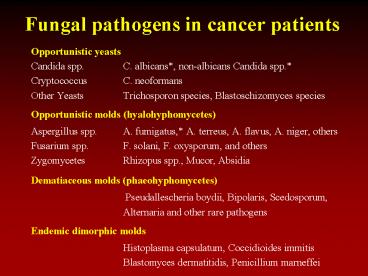Fungal pathogens in cancer patients - PowerPoint PPT Presentation
1 / 18
Title:
Fungal pathogens in cancer patients
Description:
Other Yeasts Trichosporon species, Blastoschizomyces species ... Nosocomial ICU Bloodstream Infections in US (1995-2002) 25.7 (13.8) 34.4 (18.9) 47.1 (29) ... – PowerPoint PPT presentation
Number of Views:207
Avg rating:3.0/5.0
Title: Fungal pathogens in cancer patients
1
Fungal pathogens in cancer patients
- Opportunistic yeasts
- Candida spp. C. albicans, non-albicans Candida
spp. - Cryptococcus C. neoformans
- Other Yeasts Trichosporon species,
Blastoschizomyces species - Opportunistic molds (hyalohyphomycetes)
- Aspergillus spp. A. fumigatus, A. terreus, A.
flavus, A. niger, others - Fusarium spp. F. solani, F. oxysporum, and
others - Zygomycetes Rhizopus spp., Mucor, Absidia
- Dematiaceous molds (phaeohyphomycetes)
- Pseudallescheria boydii,
Bipolaris, Scedosporum, - Alternaria and other
rare pathogens - Endemic dimorphic molds
- Histoplasma capsulatum,
Coccidioides immitis - Blastomyces
dermatitidis, Penicillium marneffei
2
Nosocomial ICU Bloodstream Infections in US
(1995-2002)
Wisplinghoff et al CID 200439309
3
Primary Prophylaxis
Colonized (Pre-emptive)
Therapy Induction Maintenance
Symptoms (Empiric)
Secondary Prophylaxis
4
Empirical antifungal therapy in the ICU?
- In the febrile non-neutropenic patient?
- - Early treatment is theoretically beneficial
- IDSA guidelines 2000
- - Appropriate use has not been defined
- Here is the Albrecht Rule
- - Days in critical care (days x number of
antibiotics) - number of risk factors (GI, TPN, steroids,
lines) gt 25 - especially if colonized gt think (and treat)
fungus - Apropos colonization
- - Anywhere works for me
- - The more sites with fungus the higher the risk
- (Pittet Ann Surg 94)
5
Fungus Food
- Anything organic (contains the element carbon)
- Cardboard
- Wallpaper glue
- Soap and body oil
- Carpet fibers
6
aspergillus from hospital water sites
Warris et al J Hosp Inf 2001 47 143
Anaissee et al Clin Infect Dis 2002 43 780
7
Health Effects of Mold
- Molds produce three major health effects
- infection
- allergic reactions
- toxicity
- Many physicians do not believe that the levels of
mold found in indoor environments can adversely
effect human health (dose versus response)
8
Guidelines
- Healthcare Infection Control Practices Advisory
Committee (HICPAC) - Guideline for Preventing Healthcare-Associated
Pneumonia 2004 CDC - Guideline for Environmental Infection Control in
Health-Care Facilities, 2003 CDC - Air Handling Systems
- Airborne Infectious Isolation (AII) Rooms
- Protective Environments (PE)
- Construction, Renovation, Remediation, Repair
Demolition
9
(No Transcript)
10
Fungi Control
- You can clean without disinfecting
- You can NOT disinfect without cleaning
11
Fungicides/Fungistats
- Sodium Hypochlorite (Bleach)
- Phenols
- Quaternary Ammonium Compounds
- Acids
- Copper-8-Quinolinate
12
Mold Abatement
- Address the source of the water incursion before
beginning clean up of mold - Porous surfaces very difficult to clean
- Removal often the only option for ceiling tiles,
drywall, carpeting - Soap and water is usually sufficient, except for
sewage incursion, which requires disinfection
13
Large Scale Abatement
- Abatement of large areas of mold damage requires
many of the same work practices used for asbestos
(area isolation, wet cleaning methods,
directional air flow with HEPA filtration)
14
Infection Control IssuesDuring Construction
- Relocate high-risk patients, issue
high-efficiency masks - Decrease high-risk admissions
- Close patient room and unit doors
- Damp-mop or HEPA-vacuum vicinity
- Check air filters regularly
- Monitor air quality
15
Post-Construction Phase
- Thoroughly clean renovated patient areas
- Pay special attention to air ducts
- Obtain cultures, particle counts
- Verify integrity of ventilation system
16
Final Points to Remember
- Understand risks for construction projects
- Educate contractor, workers in infection control
- Monitor compliance to IC procedures
17
Antifungal Therapy
- Fungi are
- Eukaryotes
- Usually haploid organisms
18
Bug
Drug
Higher inocculum More heteroresistance ?
Drug/target ratio Delayed diagnosis
Infarction Drug delivery ? Penetration Bioavailabi
lity
Steroids Neutropenia Congenital
Immunedeficiency HIV/AIDS Transplant
Host































